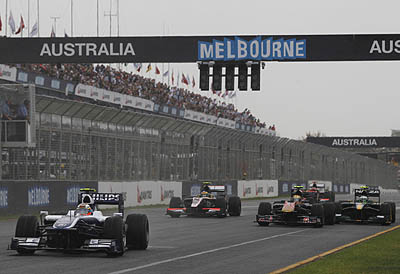


23/01/2011
NEWS STORY
 |
Melbourne's Lord Mayor, Robert Doyle, has said that it is time the city turned its back on Formula One, claiming that annual losses on the event could soon reach $70m AUD (£42.3m).
The 2010 event saw a total loss of $49.4m AUD (£29.5m), and followed a loss of A$40m for the 2009 event, indeed, the losses have been steadily growing since 2005 when the Albert Park event lost A$13m (£5.3m).
Writing in the Herald Sun, Mr Doyle says the race no longer offers the Victoria state government value for money. "My judgment would be: Get ready. Time's up," he said of the Albert Park event.
Meanwhile, Premier Ted Baillieu admitted that the race may have to go unless costs can be substantially cut. "The Grand Prix has been great for Melbourne and great for Victoria," he said, "but we look forward to the Grand Prix performing financially better than it has and we will be looking to make sure that happens."
In 2009, race attendance over the GP weekend hit an all-time low, with 287,000 spectators passing through the turnstiles. With the return of Michael Schumacher and Mercedes, Fernando Alonso at Ferrari, Jenson Button at McLaren and Mark Webber at the wheel of the best car of his F1 career, attendance was up to 300,000 last year but still the event lost money.
In defence of the Melbourne event, Australian Grand Prix Corporation chairman Ron Walker, a close friend of Bernie Ecclestone, insisted that the F1 weekend offers $180m AUD in economic benefits for the state while also claiming that losing the event would cost jobs.
"It's future is a matter for the government but the Grand Prix Corporation board does it's best to keep costs down every year,'' he said.
However, looking ahead, Doyle is under no illusion, the future of F1 in Melbourne is untenable. "We have the licence until 2015, after which there are four possibilities," he writes in the Herald Sun. "First, F1 supremo Bernie Ecclestone will pick up his bat and ball and go home. Despite best endeavours, the notoriously difficult, contentious and cranky Bernie will take the dollars of either an Asian or oil-rich Middle Eastern state. There will be no successful negotiation. End of story.
Second, given Ecclestone's ever more strident calls for a night Grand Prix, it will move to a purpose-built track either at Avalon or Noble Park, or possibly elsewhere Sydney or Perth.
"The problem with Albert Park is that it is a 300ha park and a night race means lighting not only for the track, but also for enough of the park to provide patron safety. Too expensive. But equally, the cost of a purpose-built track is potentially $300 million and is probably untenable. But even if such a track were built, it would not have the same romance or cachet as Albert Park. The Grand Prix would become one of those events we sometimes see out of Asia: empty stands, but a worldwide TV audience of hundreds of millions. To me that wouldn't really be an Australian Grand Prix, just a TV event.
"A third option is that the race remains at Albert Park," he continues. "That would require an upgrade of the park, costing up to $8-9 million. It would require Ecclestone to accept that the Australian Grand Prix will never be a night race though, with Ron Walker's extremely able negotiation, it has become a twilight race. In its present form, it satisfies both local and TV audiences for real time and reasonable time-zone viewing. Sponsorship and advertising demand that.
"The big stumbling block to this scenario is the cost to the Victorian taxpayer. In 1996 when the race was a combination of a four-day event and corporate sponsorship was far more generous than it is today, the race still needed to be underwritten by about $1.7 million. Last year it was $50 million.
"Fast forward to 2015, the year the franchise ends. Though the documented benefits for the city may include hundreds of millions of dollars of advertising value, tens of millions of dollars of local revenue, an event that will draw between 250,000 and 300,000 people over three days will come at a cost that will approach 70 million taxpayer dollars. It is the old argument: pay up front but get many times the value of the upfront payment in downstream economic benefits. For most events that formula is persuasive. But $70 million?
"The fourth and final possibility must be faced. I know of no city that has voluntarily walked away from a Grand Prix, but could Melbourne be the first?
"The final possibility is that we decide that it has been 20 fantastic years, the benefits to the city and the state have been enormous, but the cycle has run its course. It would mean we would need to replace the Grand Prix and major events don't come cheap. Nor, indeed, are there many out there that can be repeated year after year and drive the economic returns we get from the Grand Prix. We should start looking now.
"In the end, it will be a government decision and one of the tough ones that Ted Baillieu faces in his first term. Does he undo the legacy of Jeff Kennett, his mentor, in his very first term and, ironically, through the same minister to first get the event, Louise Asher?
"My judgment would be: Get ready. Time's up."